Unit 1 Topic 2 The population in developing countries is growing faster. Section D 课件(共23张PPT,内嵌音频)
文档属性
| 名称 | Unit 1 Topic 2 The population in developing countries is growing faster. Section D 课件(共23张PPT,内嵌音频) |

|
|
| 格式 | pptx | ||
| 文件大小 | 25.6MB | ||
| 资源类型 | 教案 | ||
| 版本资源 | 仁爱科普版 | ||
| 科目 | 英语 | ||
| 更新时间 | 2024-07-24 14:14:31 | ||
图片预览

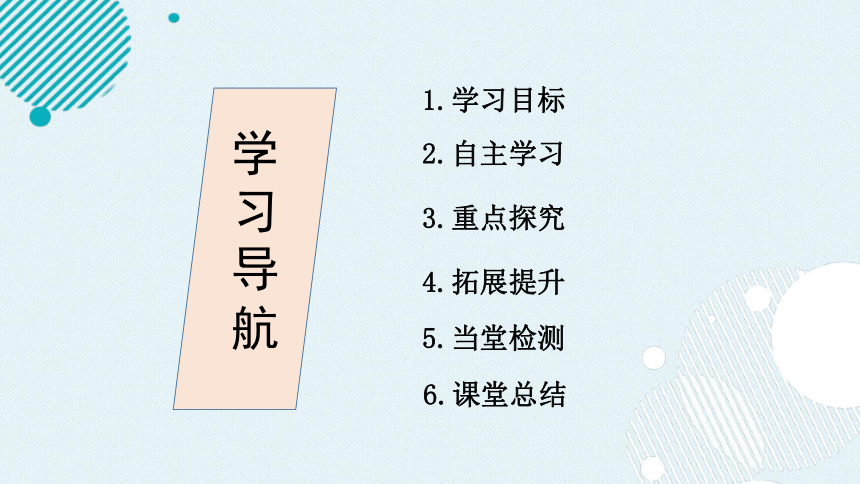
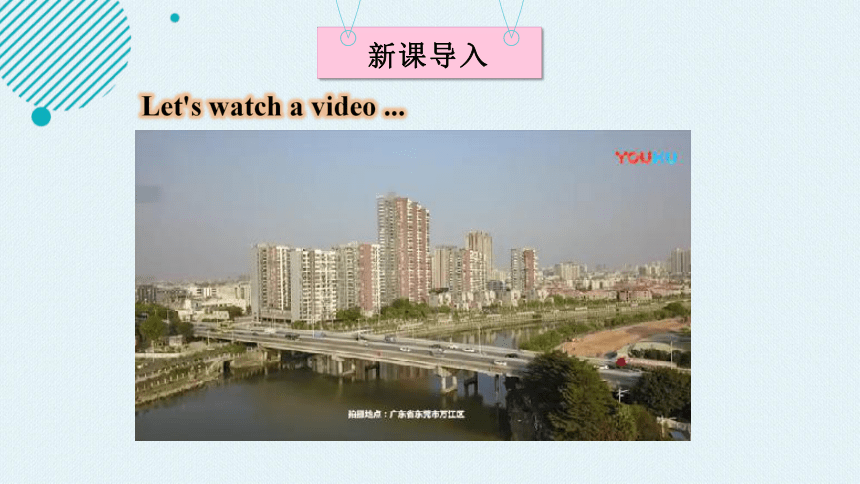
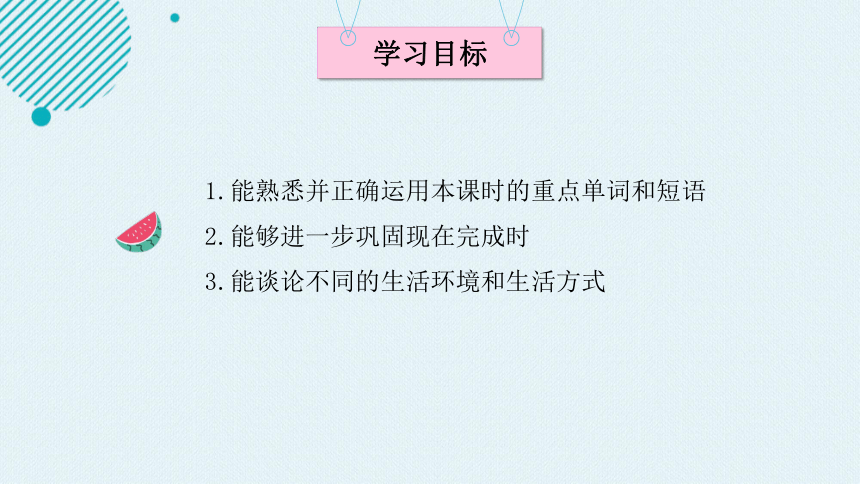


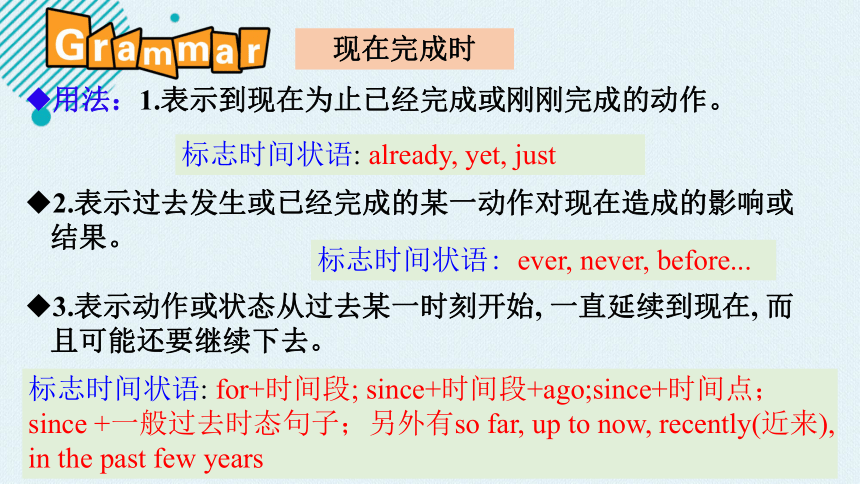
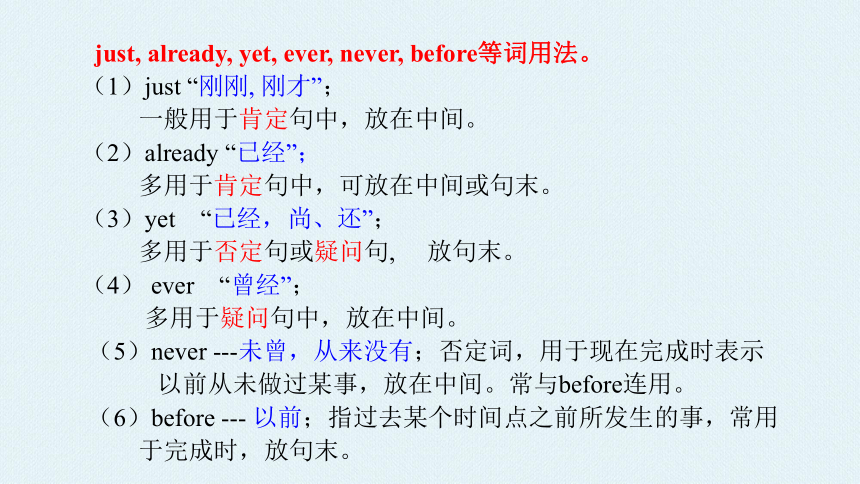
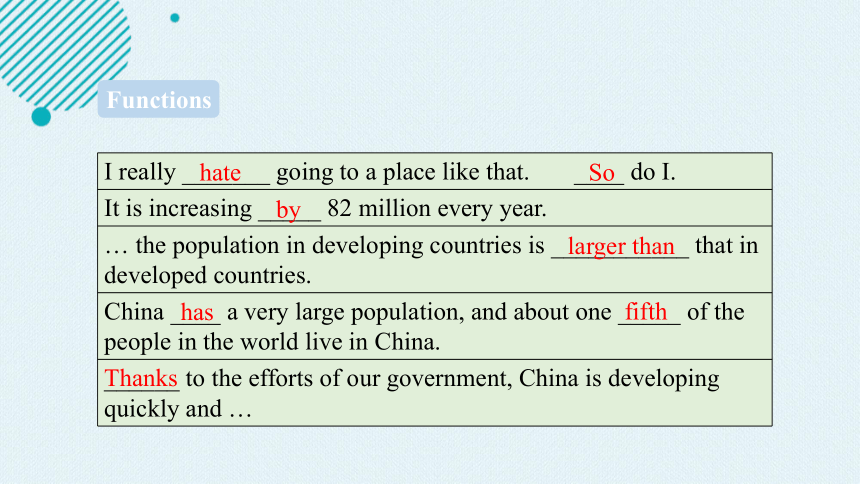
文档简介
(共23张PPT)
Unit 1
The Changing World
Topic 2
Section D
1.学习目标
3.重点探究
2.自主学习
学习导航
5.当堂检测
6.课堂总结
4.拓展提升
新课导入
Let's watch a video ...
学习目标
1.能熟悉并正确运用本课时的重点单词和短语
2.能够进一步巩固现在完成时
3.能谈论不同的生活环境和生活方式
自主学习
New words
surround v. 围绕,环绕
garbage n. (生活)垃圾,废物;垃圾场
discourage v. 阻拦,阻止;使灰心
local adj. 当地的,本地的
capital n. 首都;资本
huge adj. 巨大的,极多的
market n. 集市,市场
transportation n. 运输
excellent adj. 优秀的,杰出的
重点探究
I have ______ called you. I’ve ______ been there before.
It has ________ reached 1.36 billion, …
Have you found him _____
Have you ______ been to the cinema nearby
Present Perfect ( Ⅱ )
Grammar
just
never
already
yet
ever
现在完成时
用法:1.表示到现在为止已经完成或刚刚完成的动作。
2.表示过去发生或已经完成的某一动作对现在造成的影响或结果。
3.表示动作或状态从过去某一时刻开始, 一直延续到现在, 而且可能还要继续下去。
标志时间状语: ever, never, before...
标志时间状语: for+时间段; since+时间段+ago;since+时间点; since +一般过去时态句子;另外有so far, up to now, recently(近来), in the past few years
标志时间状语: already, yet, just
just, already, yet, ever, never, before等词用法。
(1)just “刚刚, 刚才”;
一般用于肯定句中,放在中间。
(2)already “已经”;
多用于肯定句中,可放在中间或句末。
(3)yet “已经,尚、还”;
多用于否定句或疑问句, 放句末。
(4) ever “曾经”;
多用于疑问句中,放在中间。
(5)never ---未曾,从来没有;否定词,用于现在完成时表示
以前从未做过某事,放在中间。常与before连用。
(6)before --- 以前;指过去某个时间点之前所发生的事,常用
于完成时,放句末。
Functions
I really _______ going to a place like that. ____ do I.
It is increasing _____ 82 million every year.
… the population in developing countries is ___________ that in developed countries.
China ____ a very large population, and about one _____ of the people in the world live in China.
______ to the efforts of our government, China is developing quickly and …
hate
So
by
larger than
has
fifth
Thanks
Free talk
Do you want to live in a small town like Fairmont or a big city like Beijing Why
Fairmont
Beijing
Talk with your partner about this question:
1 Read the two short passages and take notes based on the table on
Page 16.
Hello, everyone! My name is Sue. I live in Canada. Canada is a large country with a population of about 36 million. I live in a small mountain town called Fairmont. I have lived here since I was three. Fewer than 600 people live here. The small town is surrounded by trees. The air is clean and fresh. People live close to nature and try to protect it. They are careful with garbage and discourage cutting trees. The town is really like one big family. The local people often help each other and have fun together. But sometimes it is hard to see friends because they live so far away.
Hi, I'm Li Ming. I live in Beijing, the capital of China. My city has a long history and many places of interest. We have big shopping centers and huge markets. Our public transportation is excellent, too. Buses, taxis, and subways can take my friends and me to any part of the city. We can play sports, see Beijing operas, go to movie theaters, and eat delicious food. There are many fine places such as Beihai Park and Tian'anmen Square where we can meet with friends to dance or listen to music. I love my city of Beijing because I have so many friends here and we have so many interesting places to visit together.But now the large population in Beijing has caused some problems.
Name Sue Li Ming
Place in Fairmont, a small town in Beijing,
a large city
Advantage
Disadvantage
clean and fresh air, close to nature, often help each other
excellent transportation, fine and interesting places to visit
hard to see friends, live so far away
large population
Read passage 1 and choose the best answer:
1. How long has Sue lived in Fairmont
A. For three years
B. Since she was three.
C. We don’t know.
2. What don’t people often do in Fairmont
A.Help each other
B. Discourage cutting trees.
C. See friends.
Read passage 2 and choose the best answer:
3. Why does Li Ming like the capital of China
A. Because he has many friends.
B. Because of the large population.
C. Because the air is clean and fresh.
4. What do you think is the biggest problem in Beijing
A. People live far away.
B. The large population.
C. The excellent transportation.
2 Write a short passage about the place you would like to
live based on 1.
You may begin like this:
I’m … I would like to live in … First of all, …
I’m Maria. I would like to live in a big city, because it is convenient. First of all, it has excellent public transportation so that I can go to any part of the city. Second, it has many places of interest. I, with my friends, can visit these interesting places in our spare time. What’s more, it has many shopping centers and markets. We can buy things easily.
One possible version:
Project
Making a Report on Different Types of Families
1. Look at the different types of families below and discuss the advantages
and disadvantages of each type of family.
2. Which kind of family do you belong to and which one do you like
better Why
3. Report the result to the class.
extended family
nuclear family
拓展提升
Language points
1. I live in a small mountain town called Fairmont.
我居住在一个叫Fairmont 的小山城。
called Fairmont过去分词短语放在名词后作后置定语,这里called可改为named/with the name of ...。
e.g. The boy called/named/with the name of Li Lei is my brother.
名叫李雷的那个男孩是我的弟弟。
2. interest意为“吸引力,趣味”,不可数名词。
a place of interest一处名胜 places of interest 许多名胜。
e.g. There are many places of interest in our city. 我们城市有许多名胜。
①“So + be/情态动词/助动词+主语”该结构主要用来说明前面所说的情况也同样适用于后面的人或物,[意为“……也一样”]。该结构中的助动词 do 根据前文的情况也可换成 is, am, are, was, were, does, did, can, could 等。
如: He passed the exam, and so did I.
=He passed the exam, and I passed the exam, too.
但是如果前面所述情况为否定式,则用neither, nor引出倒装句(此时不能用so)。
如: He couldn’t do it, and neither could she. 他做不了这事,她也做不了。
He never comes late. Nor do I. 他从不迟到,我也从不迟到。
※ So do I 与 So I do
②“So +主语+ be/情态动词/助动词”该结构主要用于加强语气,其意为“的确如此、确实如此” ,表示后者赞同前者的话或意见,只是进一步强调并重复前句所述的内容。前后句的主语指的是同一个人或物。该结构中的助动词 do 根据前文的情况也可换成 is, am, are, was, were, does, did, can, could 等。
如:
—He has done a good job. 他干得不错。
—So he has. 他的确干得不错。
Key phrases
1. be surrounded by... 被……围绕
2. discourage (from) cutting trees 阻止砍树
3. many places of interest 许多名胜古迹
4. public transportation 公共交通运输
5. the capital of China 中国的首都
6. extended family 数代同堂的大家庭
7. nuclear family 核心家庭
当堂检测
一、情景交际
1. Miachel说他喜欢打篮球,你想告诉他你哥哥跟他有相同爱好,
你可以说:
________ my brother.
2. 当你看了有关中国人口的报道,惊讶于人口数量之大,你可以
这么说:
What ___________________!
3. 你想知道美国人口有多少,你可以这么问:
______________________________
4. 你想知道对方是否找到他的钱包了,你可以这么问:
Have _________________________
5. 你想知道对方有没有去过美国,你可以这么问:
____________________ America
So does
a large population
What’s the population of the USA
you found your wallet
Have you ever been to
课堂总结
Unit 1
Topic 2 Section D
不同的生活环境和生活方式
巩固现在完成时
Unit 1
The Changing World
Topic 2
Section D
1.学习目标
3.重点探究
2.自主学习
学习导航
5.当堂检测
6.课堂总结
4.拓展提升
新课导入
Let's watch a video ...
学习目标
1.能熟悉并正确运用本课时的重点单词和短语
2.能够进一步巩固现在完成时
3.能谈论不同的生活环境和生活方式
自主学习
New words
surround v. 围绕,环绕
garbage n. (生活)垃圾,废物;垃圾场
discourage v. 阻拦,阻止;使灰心
local adj. 当地的,本地的
capital n. 首都;资本
huge adj. 巨大的,极多的
market n. 集市,市场
transportation n. 运输
excellent adj. 优秀的,杰出的
重点探究
I have ______ called you. I’ve ______ been there before.
It has ________ reached 1.36 billion, …
Have you found him _____
Have you ______ been to the cinema nearby
Present Perfect ( Ⅱ )
Grammar
just
never
already
yet
ever
现在完成时
用法:1.表示到现在为止已经完成或刚刚完成的动作。
2.表示过去发生或已经完成的某一动作对现在造成的影响或结果。
3.表示动作或状态从过去某一时刻开始, 一直延续到现在, 而且可能还要继续下去。
标志时间状语: ever, never, before...
标志时间状语: for+时间段; since+时间段+ago;since+时间点; since +一般过去时态句子;另外有so far, up to now, recently(近来), in the past few years
标志时间状语: already, yet, just
just, already, yet, ever, never, before等词用法。
(1)just “刚刚, 刚才”;
一般用于肯定句中,放在中间。
(2)already “已经”;
多用于肯定句中,可放在中间或句末。
(3)yet “已经,尚、还”;
多用于否定句或疑问句, 放句末。
(4) ever “曾经”;
多用于疑问句中,放在中间。
(5)never ---未曾,从来没有;否定词,用于现在完成时表示
以前从未做过某事,放在中间。常与before连用。
(6)before --- 以前;指过去某个时间点之前所发生的事,常用
于完成时,放句末。
Functions
I really _______ going to a place like that. ____ do I.
It is increasing _____ 82 million every year.
… the population in developing countries is ___________ that in developed countries.
China ____ a very large population, and about one _____ of the people in the world live in China.
______ to the efforts of our government, China is developing quickly and …
hate
So
by
larger than
has
fifth
Thanks
Free talk
Do you want to live in a small town like Fairmont or a big city like Beijing Why
Fairmont
Beijing
Talk with your partner about this question:
1 Read the two short passages and take notes based on the table on
Page 16.
Hello, everyone! My name is Sue. I live in Canada. Canada is a large country with a population of about 36 million. I live in a small mountain town called Fairmont. I have lived here since I was three. Fewer than 600 people live here. The small town is surrounded by trees. The air is clean and fresh. People live close to nature and try to protect it. They are careful with garbage and discourage cutting trees. The town is really like one big family. The local people often help each other and have fun together. But sometimes it is hard to see friends because they live so far away.
Hi, I'm Li Ming. I live in Beijing, the capital of China. My city has a long history and many places of interest. We have big shopping centers and huge markets. Our public transportation is excellent, too. Buses, taxis, and subways can take my friends and me to any part of the city. We can play sports, see Beijing operas, go to movie theaters, and eat delicious food. There are many fine places such as Beihai Park and Tian'anmen Square where we can meet with friends to dance or listen to music. I love my city of Beijing because I have so many friends here and we have so many interesting places to visit together.But now the large population in Beijing has caused some problems.
Name Sue Li Ming
Place in Fairmont, a small town in Beijing,
a large city
Advantage
Disadvantage
clean and fresh air, close to nature, often help each other
excellent transportation, fine and interesting places to visit
hard to see friends, live so far away
large population
Read passage 1 and choose the best answer:
1. How long has Sue lived in Fairmont
A. For three years
B. Since she was three.
C. We don’t know.
2. What don’t people often do in Fairmont
A.Help each other
B. Discourage cutting trees.
C. See friends.
Read passage 2 and choose the best answer:
3. Why does Li Ming like the capital of China
A. Because he has many friends.
B. Because of the large population.
C. Because the air is clean and fresh.
4. What do you think is the biggest problem in Beijing
A. People live far away.
B. The large population.
C. The excellent transportation.
2 Write a short passage about the place you would like to
live based on 1.
You may begin like this:
I’m … I would like to live in … First of all, …
I’m Maria. I would like to live in a big city, because it is convenient. First of all, it has excellent public transportation so that I can go to any part of the city. Second, it has many places of interest. I, with my friends, can visit these interesting places in our spare time. What’s more, it has many shopping centers and markets. We can buy things easily.
One possible version:
Project
Making a Report on Different Types of Families
1. Look at the different types of families below and discuss the advantages
and disadvantages of each type of family.
2. Which kind of family do you belong to and which one do you like
better Why
3. Report the result to the class.
extended family
nuclear family
拓展提升
Language points
1. I live in a small mountain town called Fairmont.
我居住在一个叫Fairmont 的小山城。
called Fairmont过去分词短语放在名词后作后置定语,这里called可改为named/with the name of ...。
e.g. The boy called/named/with the name of Li Lei is my brother.
名叫李雷的那个男孩是我的弟弟。
2. interest意为“吸引力,趣味”,不可数名词。
a place of interest一处名胜 places of interest 许多名胜。
e.g. There are many places of interest in our city. 我们城市有许多名胜。
①“So + be/情态动词/助动词+主语”该结构主要用来说明前面所说的情况也同样适用于后面的人或物,[意为“……也一样”]。该结构中的助动词 do 根据前文的情况也可换成 is, am, are, was, were, does, did, can, could 等。
如: He passed the exam, and so did I.
=He passed the exam, and I passed the exam, too.
但是如果前面所述情况为否定式,则用neither, nor引出倒装句(此时不能用so)。
如: He couldn’t do it, and neither could she. 他做不了这事,她也做不了。
He never comes late. Nor do I. 他从不迟到,我也从不迟到。
※ So do I 与 So I do
②“So +主语+ be/情态动词/助动词”该结构主要用于加强语气,其意为“的确如此、确实如此” ,表示后者赞同前者的话或意见,只是进一步强调并重复前句所述的内容。前后句的主语指的是同一个人或物。该结构中的助动词 do 根据前文的情况也可换成 is, am, are, was, were, does, did, can, could 等。
如:
—He has done a good job. 他干得不错。
—So he has. 他的确干得不错。
Key phrases
1. be surrounded by... 被……围绕
2. discourage (from) cutting trees 阻止砍树
3. many places of interest 许多名胜古迹
4. public transportation 公共交通运输
5. the capital of China 中国的首都
6. extended family 数代同堂的大家庭
7. nuclear family 核心家庭
当堂检测
一、情景交际
1. Miachel说他喜欢打篮球,你想告诉他你哥哥跟他有相同爱好,
你可以说:
________ my brother.
2. 当你看了有关中国人口的报道,惊讶于人口数量之大,你可以
这么说:
What ___________________!
3. 你想知道美国人口有多少,你可以这么问:
______________________________
4. 你想知道对方是否找到他的钱包了,你可以这么问:
Have _________________________
5. 你想知道对方有没有去过美国,你可以这么问:
____________________ America
So does
a large population
What’s the population of the USA
you found your wallet
Have you ever been to
课堂总结
Unit 1
Topic 2 Section D
不同的生活环境和生活方式
巩固现在完成时
同课章节目录
- Unit 1 The Changing World
- Topic 1 Our country has developed rapidly.
- Topic 2 The population in developing countries is
- Topic 3 The world has changed for the better.
- Unit 2 Saving the earth.
- Topic 1 Pollution has causes too many problems.
- Topic 2 All these problems are very serious.
- Topic 3 What can we do to protect the environment
- Unit 3 English around the World
- Topic 1 English is widely spoken around the world.
- Topic 2 Some things usually have different meaning
- Topic 3 Could you give us some advice on how to l
- Unit 4 Amazing Science
- Topic 1 When was it invented?
- Topic 2 I'm excited about the things that will be
- Topic 3 China is the third nation that sent a pers
